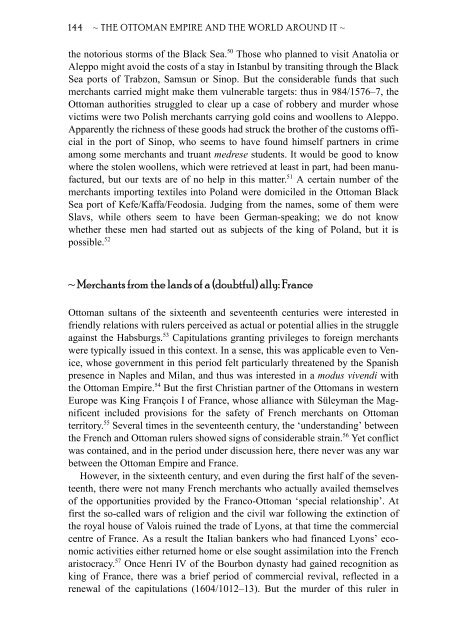The Ottoman Empire and the World Around It - Course Information
The Ottoman Empire and the World Around It - Course Information
The Ottoman Empire and the World Around It - Course Information
Create successful ePaper yourself
Turn your PDF publications into a flip-book with our unique Google optimized e-Paper software.
144 ~ THE OTTOMAN EMPIRE AND THE WORLD AROUND IT ~<br />
<strong>the</strong> notorious storms of <strong>the</strong> Black Sea. 50 Those who planned to visit Anatolia or<br />
Aleppo might avoid <strong>the</strong> costs of a stay in Istanbul by transiting through <strong>the</strong> Black<br />
Sea ports of Trabzon, Samsun or Sinop. But <strong>the</strong> considerable funds that such<br />
merchants carried might make <strong>the</strong>m vulnerable targets: thus in 984/1576–7, <strong>the</strong><br />
<strong>Ottoman</strong> authorities struggled to clear up a case of robbery <strong>and</strong> murder whose<br />
victims were two Polish merchants carrying gold coins <strong>and</strong> woollens to Aleppo.<br />
Apparently <strong>the</strong> richness of <strong>the</strong>se goods had struck <strong>the</strong> bro<strong>the</strong>r of <strong>the</strong> customs official<br />
in <strong>the</strong> port of Sinop, who seems to have found himself partners in crime<br />
among some merchants <strong>and</strong> truant medrese students. <strong>It</strong> would be good to know<br />
where <strong>the</strong> stolen woollens, which were retrieved at least in part, had been manufactured,<br />
but our texts are of no help in this matter. 51 A certain number of <strong>the</strong><br />
merchants importing textiles into Pol<strong>and</strong> were domiciled in <strong>the</strong> <strong>Ottoman</strong> Black<br />
Sea port of Kefe/Kaffa/Feodosia. Judging from <strong>the</strong> names, some of <strong>the</strong>m were<br />
Slavs, while o<strong>the</strong>rs seem to have been German-speaking; we do not know<br />
whe<strong>the</strong>r <strong>the</strong>se men had started out as subjects of <strong>the</strong> king of Pol<strong>and</strong>, but it is<br />
possible. 52<br />
~ Merchants from <strong>the</strong> l<strong>and</strong>s of a (doubtful) ally: France<br />
<strong>Ottoman</strong> sultans of <strong>the</strong> sixteenth <strong>and</strong> seventeenth centuries were interested in<br />
friendly relations with rulers perceived as actual or potential allies in <strong>the</strong> struggle<br />
against <strong>the</strong> Habsburgs. 53 Capitulations granting privileges to foreign merchants<br />
were typically issued in this context. In a sense, this was applicable even to Venice,<br />
whose government in this period felt particularly threatened by <strong>the</strong> Spanish<br />
presence in Naples <strong>and</strong> Milan, <strong>and</strong> thus was interested in a modus vivendi with<br />
<strong>the</strong> <strong>Ottoman</strong> <strong>Empire</strong>. 54 But <strong>the</strong> first Christian partner of <strong>the</strong> <strong>Ottoman</strong>s in western<br />
Europe was King François I of France, whose alliance with Süleyman <strong>the</strong> Magnificent<br />
included provisions for <strong>the</strong> safety of French merchants on <strong>Ottoman</strong><br />
territory. 55 Several times in <strong>the</strong> seventeenth century, <strong>the</strong> ‘underst<strong>and</strong>ing’ between<br />
<strong>the</strong> French <strong>and</strong> <strong>Ottoman</strong> rulers showed signs of considerable strain. 56 Yet conflict<br />
was contained, <strong>and</strong> in <strong>the</strong> period under discussion here, <strong>the</strong>re never was any war<br />
between <strong>the</strong> <strong>Ottoman</strong> <strong>Empire</strong> <strong>and</strong> France.<br />
However, in <strong>the</strong> sixteenth century, <strong>and</strong> even during <strong>the</strong> first half of <strong>the</strong> seventeenth,<br />
<strong>the</strong>re were not many French merchants who actually availed <strong>the</strong>mselves<br />
of <strong>the</strong> opportunities provided by <strong>the</strong> Franco-<strong>Ottoman</strong> ‘special relationship’. At<br />
first <strong>the</strong> so-called wars of religion <strong>and</strong> <strong>the</strong> civil war following <strong>the</strong> extinction of<br />
<strong>the</strong> royal house of Valois ruined <strong>the</strong> trade of Lyons, at that time <strong>the</strong> commercial<br />
centre of France. As a result <strong>the</strong> <strong>It</strong>alian bankers who had financed Lyons’ economic<br />
activities ei<strong>the</strong>r returned home or else sought assimilation into <strong>the</strong> French<br />
aristocracy. 57 Once Henri IV of <strong>the</strong> Bourbon dynasty had gained recognition as<br />
king of France, <strong>the</strong>re was a brief period of commercial revival, reflected in a<br />
renewal of <strong>the</strong> capitulations (1604/1012–13). But <strong>the</strong> murder of this ruler in


